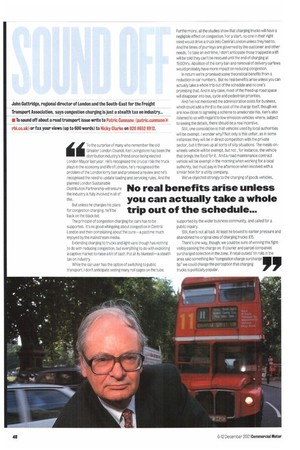dd To the surprise of many who remember the old
Page 48

If you've noticed an error in this article please click here to report it so we can fix it.
Greater London Council, Ken Livingstone has been the distribution industry's friend since being elected London Mayor last year. He's recognised the crucial role the truck plays in the economy and life of London, he's recognised the problem of the London lorry ban and promised a review and he's recognised the need to update loading and servicing rules. And the planned London Sustainable Distribution Partnership will ensure the industry is fully involved in all of this.
But unless he changes his plans for congestion charging, he'll be back on the black list.
The principle of congestion charging for cars has to be supported. It's no good whinging about congestion in Central London and then complaining about the cure—a pastime much enjoyed by the mainstream media.
Extending charging to trucks and light vans though has nothing to do with reducing congestion, but everything to do with exploiting a captive market to raise a bit of cash. Put at its bluntest—a stealth tax on industry.
While the car user has the option of switching to public transport, I don't anticipate seeing many roll cages on the tube. Furthermore, all the studies show that charging trucks will have a negligible effect on congestion. For a start, no-one in their right mind would drive a truck into Central London unless they had to. And the times ofjourneys are governed by the customer and other needs. To take an extreme, I don't anticipate those trapped in a lift will be told they can't be rescued until the end of charging at 19:00hrs. Abolition of the lorry ban and removal of delivery curfews would probably have more impact on reducing congestion.
In return we're promised some theoretical benefits from a reduction in car numbers. But no real benefits arise unless you can actually take a whole trip out of the schedule and no one's promising that. And in any case, most of the freed-up road space will disappear into bus, cycle and pedestrian priorities.
And I've not mentioned the administration costs for business, which could add a third to the cost of the charge itself, though we are now close to agreeing a scheme to ameliorate this. Ken's also listened to us with regard to low-emission vehicles where, subject to seeing the details, there should be a real incentive.
Still, one consolation is that vehicles used by local authorities will be exempt. I wonder why? Not only is this unfair, as in some Instances they will be in direct competition with the private sector, but it throws up all sorts of silly situations. The meals-onwheels vehicle will be exempt, but not , for instance, the vehicle that brings the food for it. And a road maintenance contract vehicle will be exempt in the morning when working for a local authority, but must pay in the afternoon when involved with a similar hole for a utility company.
We've objected strongly to the charging of goods vehicles, supported by the wider business community, and called for a public inquiry.
Still, Ken's not all bad. At least he bowed to earlier pressure and abandoned his original idea of charging trucks £15.
There's one way, though, we could be sure of winning this fight: visibly passing the charge on. If courier and parcel companies surcharged collection in the zone, if retail outlets' till rolls in the area said something like "congestion charge surcharge 5p" we could change the perception that charging trucks is politically popular.
























































































































































